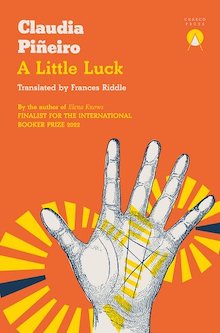
Charco Press, 2023
A Little Luck, the latest novel by Claudia Piñeiro to be translated into English, cements her reputation as a writer of pseudo-mysteries that appear superficially conventional but open up into something deeply humanistic. As she did in her prior novel, Elena Knows—which was translated into English in 2021 and shortlisted for the 2022 International Man Booker Prize—Piñeiro fixes her gaze on a woman on the fringes of society who is deeply haunted by her past, with mostly positive results.
A Little Luck starts intriguingly, in a way that’s reminiscent of a spy novel. A woman named María, who lives in Boston, says that “today, the day of my return, I look like an ordinary American woman, a Bostonian.” She’s on the road, traveling back to the town in Argentina where she once lived, in order to evaluate a school for her employer, an education company. She teaches Spanish classes and hasn’t been back to Argentina in twenty years. The trip is mysteriously difficult for her, a matter of great pain.
The novel is told as entries from a “logbook” she keeps for the trip. She wrestles with whether to write in the third or first person, settling on the first because “that’s the only way to describe the pain.” The narrator seems scared to confess any details of her life and she finds it hard to write in her notebook. She asks, “do I deserve to explain why? What I mean is, do I have that right? The right to unburden myself and expect someone to listen?” The source of her pain becomes clearer: She was involved in a tragic accident when she lived in Argentina years before. As fresh details emerge, we see that María is holding back information not only because she can’t confront her past but also because she doesn’t believe her life is worth caring about.
A remarkably empathetic writer, Piñeiro never tries to justify the actions taken by María that contributed to the accident. Instead Piñeiro leads the reader to wonder: Can someone whom society has deemed irredeemable still have a life full of meaning? This seems to be what María is working through as she confronts herself in her writing while returning to her previous home in order to find closure and reconnect with her family.
Piñeiro is a master at withholding information, revealing it slowly as the central conflict unfolds. Part of the joy of reading her work is in the gradual accumulation of these details. Throughout the novel, Piñeiro repeats a passage: “The barrier arm was down. She stopped, behind two other cars. The alarm bell rang out through the afternoon silence.” With each repetition, a little more context is revealed. With these repetitions Piñeiro is both teasing the reader and conveying the pain of her heroine. By building a bigger picture of this moment—which, in essence, reads like a memory—Piñeiro allows us to see María working through it.
Despite the many devices Piñeiro uses to create intrigue, A Little Luck never quite feels like a mystery. Sometimes this makes for a rich reading experience. At other times it grates. Once the central mystery starts to become clear, the novel loses steam. While it is beautiful to see María’s new life take shape and to witness her path to self-forgiveness, the prose gets repetitive and the pace slackens.
Piñeiro likes to trap her characters. The trap might be the body, as in Elena Knows, or it might be a gated subdivision, as in her 2005 debut, translated into English as Thursday Night Widows. These claustrophobic settings reflect Piñeiro’s sense of Argentinian society’s oppressiveness. With A Little Luck, Piñeiro strives for more subtlety. This time, her claustrophobic framing device is the past itself. Pushing her protagonist to confront it, Piñeiro doesn’t provide easy answers. Moving on will always be a process for María, especially when it comes to public opinion, but Piñeiro seems to be saying that forgiveness begins with the self.
A Little Luck is a deep dive on the effects of shame, showing how a moment of shame can become a longstanding trauma. As the novel reaches its climax, the narrator’s demons release her, and María forms a fresh bond with someone she thought she’d lost forever. Later she contemplates happiness, something she would have never let herself do at the novel’s beginning. For her, happiness can’t be put into words, because to define it would kill it. María states that one must accept a moment of happiness, “in its pure, condensed form, without allowing language and its obsession with narration to dilute the intensity.” A Little Luck is centered on this prevailing concept, how language can be both curse and blessing, and it offers a realistic happy ending in which María begins again to recognize happiness.
+++
Born in Buenos Aires in 1960, Claudia Piñeiro is the third most translated Argentinean author, after Jorge Luis Borges and Julio Cortázar. Frequently adapted for the big screen, her best-selling and award-winning fiction is rooted in the detective novel and has lately become increasingly reflective of the active role she plays in the fights for the legalization of abortion in Argentina and Latin America, and for the recognition of employment rights for writers. Piñeiro’s novel Elena Knows, also published by Charco, was shortlisted for the 2022 International Booker Prize.
+
Frances Riddle is the award-winning translator of numerous Spanish-language authors. In 2022, her translation of Elena Knows by Claudia Piñeiro was shortlisted for the International Booker Prize. Originally from Houston, she lives in Buenos Aires.
+
Patrick Boyd is a writer, director, and actor who currently resides in Los Angeles with his partner, Sining, and their two cats, Raymond and Bridget Jones.